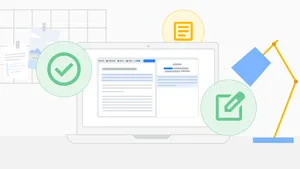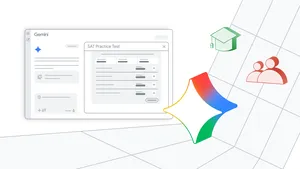The She Word: how Emily Hanley shares her passion for computer science
Editor’s Note: The She Word is a Keyword series all about dynamic and creative women at Google. Last week, the Grow with Google tour—which brings workshops, one-on-one coaching, and hands-on demos to cities across the U.S.—stopped in Lansing, Michigan. Emily Hanley, one of our very own software engineers and a Michigan native, taught introductory coding classes at the event. We spoke to her about returning to her hometown to teach, exposing more kids to computer science, and how her Google Home helps her have more dance parties with her kids.
What was your biggest takeaway from Grow with Google in Lansing?
It was inspiring to see so many people excited about the opportunity to not only interact with Google products, but to try out programming.
What was one memorable moment of the day?
Seeing the “ah ha” moments when people realized they had actually written code and produced something on their own. The classrooms were packed all day long, and it was so neat to interact with people who realized the potential of what they had just learned to do. People shared their stories of how they were already using technology in their fields, and this class helped them think about how they could do even more.
Grow with Google's event in Lansing was close to where you grew up. What was it like to go back to your hometown?
It’s amazing to see the investment in towns like Lansing, and to witness the revitalization that’s happening. People are bringing new ideas and technology to industries that have existed in Michigan for decades.


How did you get your start at Google?
I started as an intern in 2007 and have been here ever since—you could say I’ve grown up with Google.
How do you explain your job at a dinner party?
I’m a software engineer—I speak the language of computers. I work on the Chrome browser and make sure that other engineers who write code for Chrome don’t make it slower.
What advice do you have for girls who want to be engineers?
Don’t be afraid to dig in. Sometimes that means failing, but failure is a natural discovery that helps you figure out what you’re good at. Always ask the question that’s on your mind—chances are half the room is thinking the same thing, and more importantly, it’s how you grow.
Tell us about your path to computer science.
I didn’t learn about computers until college. I was more into physics and chemistry, and computers seemed like a black box. That’s part of why I’m so passionate about computer science education—if I can pass on what I’ve learned to the next generation, they can make something even bigger. They’ll do it tenfold.
When kids are exposed to CS at a young age, it becomes a crucial tool for them. It’s not just a platform for playing games. And you can use CS no matter what your passion is. If it’s fashion or journalism or something else, CS can be a part of it.
Who has helped you along your journey?
My mom always told me there’s never a dream too big. She was always an advocate and a dreamer. Whenever I’ve felt intimidated, or had less technical experience that others in the room, I thought, “Dang it, I’ll work harder and find the next door to bang down.” My mom taught me that.
How do you pass that advice onto your own (five!) kids?
The biggest thing I want to give all my children is confidence in themselves and their abilities to pursue their passion (I always say “pursue your passion, not a paycheck”). So often people internalize criticisms and roadblocks as indications they aren't good enough to keep going on that path, instead of seeing those roadblocks as opportunities to grow.
What role does technology play in your family life?
I have five kids under the age of 7. I try to make technology part of our everyday life, but not the main focus of it. We utilize our Google Home for things like dance parties and measurements when cooking. We use Google for school projects, printing coloring sheets and buying birthday presents. We take tons of photos and make Google Photobooks from our phones so we can have them on our coffee table. I want them to use technology as a tool to aid in their lives, but I don't want it to replace human connections.







